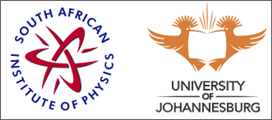Speaker
Level for award<br> (Hons, MSc, <br> PhD)?
No
Apply to be<br> considered for a student <br> award (Yes / No)?
No
Main supervisor (name and email)<br>and his / her institution
No
Abstract content <br> (Max 300 words)<br><a href="http://events.saip.org.za/getFile.py/access?resId=0&materialId=0&confId=34" target="_blank">Formatting &<br>Special chars</a>
Josephson junctions are regarded as excellent model systems for studying a variety of nonlinear phenomena in different fields of science such as frequency locking, chaos, charge density waves, transport in superconducting nanowires, interference phenomena and others. These phenomena, and especially properties of the Shapiro steps in Josephson junctions are very important for technical applications. In a Josephson system driven by an external microwave radiation, the so-called devil's staircase (DS) structure has been predicted as a consequence of the interplay of the Josephson plasma frequency, and the applied frequency. To stress the universality in the scenario presented, we note that the devil's staircase appears in other systems including the infinite spin chains with long-range interactions, frustrated quasi-two-dimensional spin-dimer system in magnetic fields, systems of strongly interacting Rydberg atoms, and fractional quantum Hall effect.
Our detailed numerical simulations of the IV-characteristics of a Josephson junction under external electromagnetic radiation show the devil's staircase within different bias current interval [1]. We have found that the observed steps form very precisely continued fractions. Increasing of the amplitude of radiation shifts the devil's staircase to higher Shapiro steps. The algorithm of appearing and detection of the subharmonics with increasing radiation amplitude is proposed. We demonstrate that subharmonic steps registered in the many different experiments also form continued fractions.
[1] Yu. M. Shukrinov, S. Yu. Medvedeva, A. E. Botha, M. R. Kolahchi, and A. Irie. Devil’s Staircases and Continued Fractions in the Josephson Junctions, - Phys. Rev. B, 88, 214515 (2013).
Would you like to <br> submit a short paper <br> for the Conference <br> Proceedings (Yes / No)?
Yes

